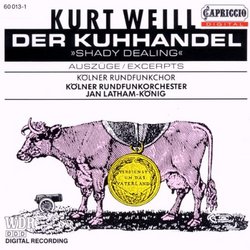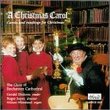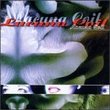| All Artists: Weill Title: Der Kuhhandel Members Wishing: 0 Total Copies: 0 Label: Capriccio Release Date: 4/16/1995 Genre: Classical Style: Opera & Classical Vocal Number of Discs: 1 SwapaCD Credits: 1 UPCs: 018111601320, 4006408600138 |
Search - Weill :: Der Kuhhandel
 | Weill Der Kuhhandel Genre: Classical
|
Larger Image |
CD DetailsSimilar CDs
|
CD ReviewsThe missing link! krebsman | New York, NY United States | 05/31/2007 (4 out of 5 stars) "For more than six decades the career of Kurt Weill has puzzled lovers of musical theatre. His early work in Germany sounds so very different from his American work. How did he get from there to there? I believe DER KUHHANDEL supplies the missing link. This operetta was written after Weill fled Germany but before he came to America. With a libretto by fellow German émigré Robert Vambery, this operetta takes place in a mythical Latin American country and concerns a military dictatorship. The title literally translates as "The Cow Dealer." The phrase "cow dealer" in German is really more akin to "horse trader" in English in that it indicates a smooth operator whose dealings are not always on the up-and-up. The show was adapted (quite liberally) into English by Reginald Arkell and Desmond Carter in 1935 as "Kingdom for a Cow" and quickly flopped in London's West End. The show was never recorded and the music was for the most part forgotten. Its failure was a source of deep distress for Weill, who worried that he would not be successful outside Germany. As a result all but a few of his American collaborators carried the cachet of being Pulitzer Prize winners.
But the music for DER KUHHANDEL is a revelation. The score utilizes primarily Latin rhythms, but it sounds about as "Latin" as Weill's tangos in THREEPENNY and HAPPY END. The music is extremely melodic and accessible but has echoes of his German scores and flashes of his American scores to come. One song sounds like a combination of phrases from "September Song" (KNICKERBOCKER HOLIDAY) and "Matrosenlied-Tango" (HAPPY END)! The score also contains bits and pieces I recognized from THREEPENNY OPERA, STREET SCENE and LOST IN THE STARS. There are probably other borrowings that I will discover with repeated listening. I have fallen in love with this score and would recommend it without hesitation to Weill fans. My only quibble is that I wish the recording had used a more natural musical comedy approach and less of the throaty operatic and artificial style of singing, which manages to rob the music of a lot of the humor. But it's great to have a recording of this score at long last. Four stars." |

 Track Listings (14) - Disc #1
Track Listings (14) - Disc #1

